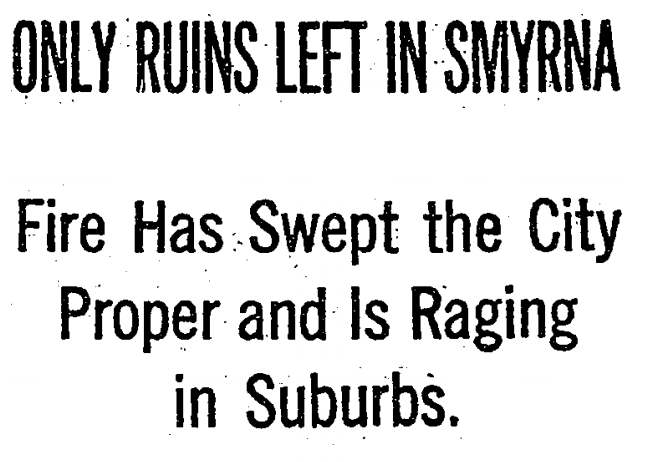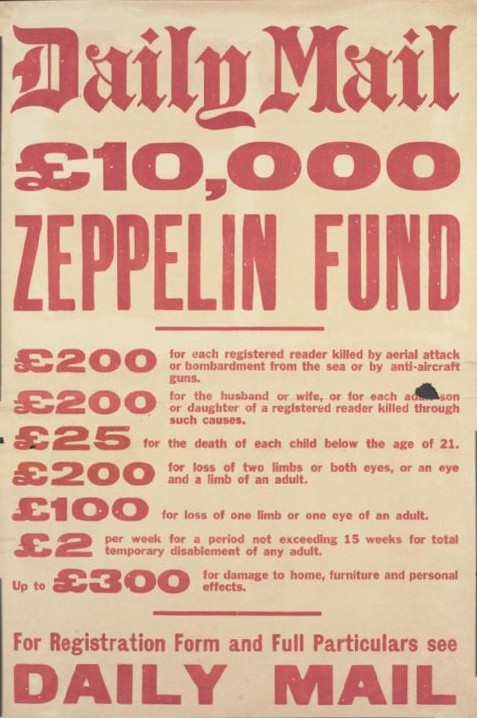|
Great Fire Of Smyrna
The burning of Smyrna ( el, Καταστροφή της Σμύρνης, "Smyrna Catastrophe"; tr, 1922 İzmir Yangını, "1922 Izmir Fire"; hy, Զմիւռնիոյ Մեծ Հրդեհ, ''Zmyuṙno Mets Hrdeh'') destroyed much of the port city of Smyrna (modern İzmir, Turkey) in September 1922. Eyewitness reports state that the fire began on 13 September 1922Horton, George. '' The Blight of Asia''. Indianapolis: The Bobbs-Merrill Company, 1926; repr. London: Gomidas Institute, 2003, p. 96. and lasted until it was largely extinguished on 22 September. It began four days after the Turkish military captured the city on 9 September, effectively ending the Greco-Turkish War, more than three years after the landing of Greek army troops at Smyrna on 15 May 1919. Estimated Greek and Armenian deaths resulting from the fire range from 10,000 to 125,000.Naimark, ''Fires of Hatred'', p. 52. Approximately 80,000 to 400,000 Greek and Armenian refugees crammed the waterfront to escape from the ... [...More Info...] [...Related Items...] OR: [Wikipedia] [Google] [Baidu] |
Greco-Turkish War (1919–1922)
The Greco-Turkish War of 1919–1922, ota, گرب جابهاسی, Garb Cebhesi) in Turkey, and the Asia Minor Campaign ( el, Μικρασιατική Εκστρατεία, Mikrasiatikí Ekstrateía) or the Asia Minor Catastrophe ( el, Μικρασιατική Καταστροφή, Mikrasiatikí Katastrofí) in Greece. Also referred to as the Greek invasion of Anatolia., group=lower-alpha was fought between Kingdom of Greece (Glücksburg), Greece and the Turkish National Movement during the partitioning of the Ottoman Empire in the aftermath of World War I, between May 1919 and October 1922. The Greek campaign was launched primarily because the western Allies of World War I, Allies, particularly Prime Minister of the United Kingdom, British Prime Minister David Lloyd George, had promised Greece territorial gains at the expense of the Ottoman Empire, recently defeated in World War I. Greek claims stemmed from the fact that Anatolia had been part of Ancient Greece and the Byzant ... [...More Info...] [...Related Items...] OR: [Wikipedia] [Google] [Baidu] |
Refugee
A refugee, conventionally speaking, is a displaced person who has crossed national borders and who cannot or is unwilling to return home due to well-founded fear of persecution.FAQ: Who is a refugee? ''www.unhcr.org'', accessed 22 June 2021 Such a person may be called an until granted by the contracting state or the |
Sanjak
Sanjaks (liwāʾ) (plural form: alwiyāʾ) * Armenian language, Armenian: նահանգ (''nahang''; meaning "province") * Bulgarian language, Bulgarian: окръг (''okrǔg''; meaning "county", "province", or "region") * el, Διοίκησις (''dioikēsis'', meaning "province") or επαρχία (''eparchia'', meaning "eparchy") * lad, sancak , group=note (; ota, ; Modern Turkish: ''Sancak'', ) were administrative divisions of the Ottoman Empire. ''Sanjak'', and the variant spellings ''sandjak'', ''sanjaq'' and ''sinjaq'', are English language, English or French language, French transliterations of the Turkish language, Turkish word ''sancak'', meaning "district", "banner (country subdivision), banner" or "flag". Sanjaks were also called by the Arabic language, Arabic word for ''banner'' or ''flag'': ''Liwa (Arabic), liwa (Liwā or Liwā’)''. Ottoman provinces (eyalets, later vilayets) were divided into sanjaks (also called ''livas'') governed by sanjakbeys (also calle ... [...More Info...] [...Related Items...] OR: [Wikipedia] [Google] [Baidu] |
Ottoman Empire
The Ottoman Empire, * ; is an archaic version. The definite article forms and were synonymous * and el, Оθωμανική Αυτοκρατορία, Othōmanikē Avtokratoria, label=none * info page on book at Martin Luther University) // CITED: p. 36 (PDF p. 38/338) also known as the Turkish Empire, was an empire that controlled much of Southeast Europe, Western Asia, and Northern Africa between the 14th and early 20th centuries. It was founded at the end of the 13th century in northwestern Anatolia in the town of Söğüt (modern-day Bilecik Province) by the Turkoman tribal leader Osman I. After 1354, the Ottomans crossed into Europe and, with the conquest of the Balkans, the Ottoman beylik was transformed into a transcontinental empire. The Ottomans ended the Byzantine Empire with the conquest of Constantinople in 1453 by Mehmed the Conqueror. Under the reign of Suleiman the Magnificent, the Ottoman Empire marked the peak of its power and prosperity, as well a ... [...More Info...] [...Related Items...] OR: [Wikipedia] [Google] [Baidu] |
Levant
The Levant () is an approximate historical geographical term referring to a large area in the Eastern Mediterranean region of Western Asia. In its narrowest sense, which is in use today in archaeology and other cultural contexts, it is equivalent to a stretch of land bordering the Mediterranean in South-western Asia,Gasiorowski, Mark (2016). ''The Government and Politics of the Middle East and North Africa''. }, ), meaning "the eastern place, where the Sun rises". In the 13th and 14th centuries, the term ''levante'' was used for Italian maritime commerce in the Eastern Mediterranean, including Greece, Anatolia, Syria-Palestine, and Egypt, that is, the lands east of Venice. Eventually the term was restricted to the Muslim countries of Syria-Palestine and Egypt. In 1581, England set up the Levant Company to monopolize commerce with the Ottoman Empire. The name ''Levant States'' was used to refer to the French mandate over Syria and Lebanon after World War I. This is probab ... [...More Info...] [...Related Items...] OR: [Wikipedia] [Google] [Baidu] |
Christians
Christians () are people who follow or adhere to Christianity, a monotheistic Abrahamic religion based on the life and teachings of Jesus Christ. The words ''Christ'' and ''Christian'' derive from the Koine Greek title ''Christós'' (Χριστός), a translation of the Biblical Hebrew term ''mashiach'' (מָשִׁיחַ) (usually rendered as ''messiah'' in English). While there are diverse interpretations of Christianity which sometimes conflict, they are united in believing that Jesus has a unique significance. The term ''Christian'' used as an adjective is descriptive of anything associated with Christianity or Christian churches, or in a proverbial sense "all that is noble, and good, and Christ-like." It does not have a meaning of 'of Christ' or 'related or pertaining to Christ'. According to a 2011 Pew Research Center survey, there were 2.2 billion Christians around the world in 2010, up from about 600 million in 1910. Today, about 37% of all Christians live in the Am ... [...More Info...] [...Related Items...] OR: [Wikipedia] [Google] [Baidu] |
Daily Mail
The ''Daily Mail'' is a British daily middle-market tabloid newspaper and news websitePeter Wilb"Paul Dacre of the Daily Mail: The man who hates liberal Britain", ''New Statesman'', 19 December 2013 (online version: 2 January 2014) published in London. Founded in 1896, it is the United Kingdom's highest-circulated daily newspaper. Its sister paper ''The Mail on Sunday'' was launched in 1982, while Scottish and Irish editions of the daily paper were launched in 1947 and 2006 respectively. Content from the paper appears on the MailOnline website, although the website is managed separately and has its own editor. The paper is owned by the Daily Mail and General Trust. Jonathan Harmsworth, 4th Viscount Rothermere, a great-grandson of one of the original co-founders, is the current chairman and controlling shareholder of the Daily Mail and General Trust, while day-to-day editorial decisions for the newspaper are usually made by a team led by the editor, Ted Verity, who succeede ... [...More Info...] [...Related Items...] OR: [Wikipedia] [Google] [Baidu] |
The Daily Telegraph
''The Daily Telegraph'', known online and elsewhere as ''The Telegraph'', is a national British daily broadsheet newspaper published in London by Telegraph Media Group and distributed across the United Kingdom and internationally. It was founded by Arthur B. Sleigh in 1855 as ''The Daily Telegraph & Courier''. Considered a newspaper of record over ''The Times'' in the UK in the years up to 1997, ''The Telegraph'' generally has a reputation for high-quality journalism, and has been described as being "one of the world's great titles". The paper's motto, "Was, is, and will be", appears in the editorial pages and has featured in every edition of the newspaper since 19 April 1858. The paper had a circulation of 363,183 in December 2018, descending further until it withdrew from newspaper circulation audits in 2019, having declined almost 80%, from 1.4 million in 1980.United Newspapers PLC and Fleet Holdings PLC', Monopolies and Mergers Commission (1985), pp. 5–16. Its si ... [...More Info...] [...Related Items...] OR: [Wikipedia] [Google] [Baidu] |
Western World
The Western world, also known as the West, primarily refers to the various nations and state (polity), states in the regions of Europe, North America, and Oceania.Western Civilization Our Tradition; James Kurth; accessed 30 August 2011 The Western world is also known as the Occident (from the Latin word ''occidēns'' "setting down, sunset, west") in contrast to the Eastern world known as the Orient (from the Latin word ''oriēns'' "origin, sunrise, east"). Following the Discovery of America in 1492, the West came to be known as the "world of business" and trade; and might also mean the Northern half of the North–South divide, the countries of the ''Global North'' (often equated with capitalist Developed country, developed countries). [...More Info...] [...Related Items...] OR: [Wikipedia] [Google] [Baidu] |
Heath W
A heath () is a shrubland habitat found mainly on free-draining infertile, acidic soils and characterised by open, low-growing woody vegetation. Moorland is generally related to high-ground heaths with—especially in Great Britain—a cooler and damper climate. Heaths are widespread worldwide but are fast disappearing and considered a rare habitat in Europe. They form extensive and highly diverse communities across Australia in humid and sub-humid areas where fire regimes with recurring burning are required for the maintenance of the heathlands.Specht, R.L. 'Heathlands' in 'Australian Vegetation' R.H. Groves ed. Cambridge University Press 1988 Even more diverse though less widespread heath communities occur in Southern Africa. Extensive heath communities can also be found in the Texas chaparral, New Caledonia, central Chile, and along the shores of the Mediterranean Sea. In addition to these extensive heath areas, the vegetation type is also found in scattered locations across ... [...More Info...] [...Related Items...] OR: [Wikipedia] [Google] [Baidu] |
Jews
Jews ( he, יְהוּדִים, , ) or Jewish people are an ethnoreligious group and nation originating from the Israelites Israelite origins and kingdom: "The first act in the long drama of Jewish history is the age of the Israelites""The people of the Kingdom of Israel and the ethnic and religious group known as the Jewish people that descended from them have been subjected to a number of forced migrations in their history" and Hebrews of historical History of ancient Israel and Judah, Israel and Judah. Jewish ethnicity, nationhood, and religion are strongly interrelated, "Historically, the religious and ethnic dimensions of Jewish identity have been closely interwoven. In fact, so closely bound are they, that the traditional Jewish lexicon hardly distinguishes between the two concepts. Jewish religious practice, by definition, was observed exclusively by the Jewish people, and notions of Jewish peoplehood, nation, and community were suffused with faith in the Jewish God, ... [...More Info...] [...Related Items...] OR: [Wikipedia] [Google] [Baidu] |
Muslims
Muslims ( ar, المسلمون, , ) are people who adhere to Islam, a monotheistic religion belonging to the Abrahamic tradition. They consider the Quran, the foundational religious text of Islam, to be the verbatim word of the God of Abraham (or '' Allah'') as it was revealed to Muhammad, the main Islamic prophet. The majority of Muslims also follow the teachings and practices of Muhammad ('' sunnah'') as recorded in traditional accounts (''hadith''). With an estimated population of almost 1.9 billion followers as of 2020 year estimation, Muslims comprise more than 24.9% of the world's total population. In descending order, the percentage of people who identify as Muslims on each continental landmass stands at: 45% of Africa, 25% of Asia and Oceania (collectively), 6% of Europe, and 1% of the Americas. Additionally, in subdivided geographical regions, the figure stands at: 91% of the Middle East–North Africa, 90% of Central Asia, 65% of the Caucasus, 42% of Southeast Asi ... [...More Info...] [...Related Items...] OR: [Wikipedia] [Google] [Baidu] |



.png)




.jpeg/1200px-Amrum_(187753235).jpeg)
